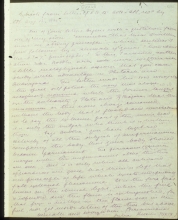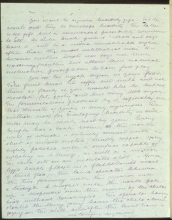Extracts from Letters of K.H. to A.O.H. and A.P.S. Received by A.P.S. August 13th, 1882.
One of your letters begins with a quotation from one of my own . . . "Remember that there is within man no abiding principle" — which sentence I find followed by a remark of yours "How about the sixth and seventh principles?" To this I answer, neither Atma nor Buddhi ever were within man, — a little metaphysical axiom that you can study with advantage in Plutarch and Anaxagoras. The latter made his — nous autochrates — the spirit self-potent, the nous that alone recognised noumena while the former taught on the authority of Plato and Pythagoras that the denominer or this nous always remained without the body; that it floated and overshadowed so to say the extreme part of the man's head, it is only the vulgar who think it is within them . . . Says Buddha "you have to get rid entirely of all the subjects of impermanence composing the body that your body should become permanent. The permanent never merges with the impermanent although the two are one. But it is only when all outward appearances are gone that there is left that one principle of life which exists independently of all external phenomena. It is the fire that burns in the eternal light, when the fuel is expended and the flame is extinguished; for that fire is neither in the flame nor in the fuel, nor yet inside either of the two but above beneath and everywhere — (Parinirvana Sutra Kiouen XXXIX).




Plutarch was a Roman historian and biographer who was in accord with Plato's philosophy.
Anaxagoras was a Greek philosopher and scientist who introduced the concept of Nous (mind).